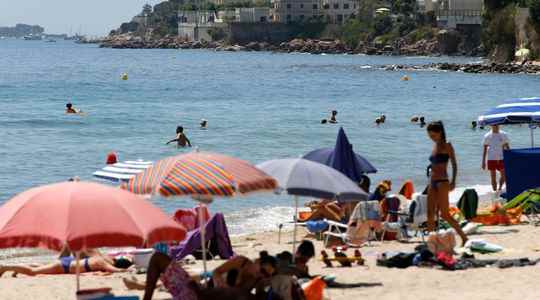Will Russian tourists have to desert European beaches? In any case, this is the wish expressed by Ukrainian President Volodymyr Zelensky, who called on his Western allies to close their borders to nationals of the country led by Vladimir Putin. Tourists from Russia must “stay in their world as long as they do not change their philosophy”, he argued during a river interview granted to the washington post, August 8. These declarations were applauded by the neighboring countries – the Baltic States in the lead – who want to see Brussels tighten the screw on this file.
The subject will be discussed at the end of August by the European Union, indicated on Friday August 12 the head of Czech diplomacy Jan Lipavsky, whose country chairs the Council of the EU. “In this period of Russian aggression, which the Kremlin continues to intensify, there can be no question of tourism as usual for Russian citizens,” he argued. While the European Union appears divided on this subject, the sanctions must be adopted unanimously by the Twenty-Seven. It should be noted that the Member States have, at the same time, considerable leeway for issuing visas for short stays.
In response to the Russian invasion of Ukraine, the European Union closed its airspace to Russian flights, but tourists took other routes to enter the Schengen area, via border countries. At their neighbors, they obtain a visa which acts as a pass to stay and travel freely, with however a limit of 90 days. Only certain nationals on the Western sanctions list, like many oligarchs, are not allowed to set foot on European soil.
Finland is one of the gateway countries. If Helsinki asked to join NATO after the Kremlin offensive in Ukraine, it is the only EU member bordering Russia to still issue tourist visas to Russian citizens. But in this state of 5.5 million inhabitants, which shares the longest border with the Putin regime, anger is brewing at the arrival of Russian tourists. Some citizens even accuse the Finnish government of inaction. Monday August 8, Prime Minister Sanna Marin (SDP) thus came out of her reserve: questioned by the Finnish media EPN, she called for an EU-wide decision on limiting the entry of Russian tourists into Schengen countries. In the meantime, Finland has the possibility of intervening itself by making it more difficult to obtain tourist visas. This was suggested by Foreign Minister Pekka Haavisto (Green).
“Visiting Europe is a privilege”
Other European countries bordering Russia – Estonia, Latvia, Lithuania and Poland – have completely stopped issuing visas to Russian citizens. In Tallinn, the Estonian Prime Minister seems categorical: “Visiting Europe is a privilege, not a human right”, retorts Kaja Kallas on Twitter, echoing the words of her Ukrainian counterpart. “Visiting Europe is a privilege, not a right,” he said.
Like Poland and the Czech Republic, Estonia no longer grants, with a few exceptions, visas to Russian citizens since July 28. And the system will become more severe from August 18, the date from which Russians who have obtained a visa in the country to enter the EU will no longer be able to stay in the territory. At the end of July, the Estonian government had already blocked student visas for Russians.
On the Russian front, the Baltic trio shows unity. On Thursday August 11, the Latvian Parliament stepped up its offensive against Russia, calling it a “State supporting terrorism”. MEPs from Riga also called on the European Union to stop issuing tourist visas to Russian and Belarusian citizens.
‘A desperate attempt’ to isolate Russia
But what is Brussels’ room for maneuver on this dossier? As a first step, the Council of the European Union has the option of suspending or abrogating the visa facilitation agreement between Russia and the EU. Making it easier to obtain their visas at reduced prices, this regime has been partially suspended since February 25 for certain categories of people deemed to be close to power. Furthermore, a visa ban for Russian tourists also raises a moral question, since it would target the entire Russian population the six sets of restrictive measures taken so far have attempted to differentiate ordinary Russian citizens from the regime. The Commission does not hide its reluctance and insists on the need to protect dissidents, journalists and families.
For its part, the Kremlin unsurprisingly condemns this proposal. “Any attempt to isolate Russia or the Russians is a desperate attempt,” said Kremlin spokesman Dimitry Peskov. His invectives are relayed by the russian daily online Gazeta.ru. “We see that such remarks are made by countries already declared by us to be unfriendly… Their enmity causes them to regress towards the type of declarations that could be heard in the center of Europe eighty years ago .” From a distance, Moscow will no doubt be delighted to see how the European Union could get ripped off on this issue.
